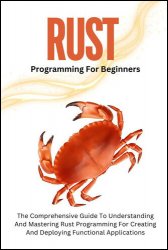 Название: Rust Programming For Beginners: The Comprehensive Guide To Understanding And Mastering Rust Programming For Creating And Deploying Functional Applications Название: Rust Programming For Beginners: The Comprehensive Guide To Understanding And Mastering Rust Programming For Creating And Deploying Functional Applications
Автор: Voltaire Lumiere
Издательство: Independently published
Год: 2024
Страниц: 1326
Язык: английский
Формат: pdf, azw3, epub, mobi
Размер: 10.1 MB
With the help of the Ultimate Beginners Guide to Rust, you can Unleash the Raw Power of the Rust Programming Language and Create High-Performance, Scalable, and Fault-Tolerant Applications! Do you want to learn how to write robust programs...
With the help of the Ultimate Beginners Guide to Rust, you can Unleash the Raw Power of the Rust Programming Language and Create High-Performance, Scalable, and Fault-Tolerant Applications!
Do you want to learn how to write robust programs that can support millions of users at once without crashing, but you're not sure where to start?
Are you a programmer who uses object-oriented programming presently and are considering switching to functional programming?
One of the finest things you can do for your software career is to learn the Rust programming language if any of the following questions apply to you.
This thorough introduction to the Rust programming language for beginners takes you inside the language's workings and demonstrates how to utilize its many features, from setting up Rust on your PC and executing your first code to building scalable apps.
Rust, a modern systems programming language, has a rich and intriguing history that dates back to the mid-2000s. The primary motivation behind Rust's inception was to create a language that would provide developers with the power and flexibility of low-level programming while mitigating the common pitfalls associated with manual memory management, such as segmentation faults, dangling pointers, and data races. One of the foundational pillars of Rust's design is its ownership system, which forms the cornerstone of the language's approach to memory management and safety. The ownership system, inspired by concepts from academic research and practical experience, enables Rust to enforce memory safety guarantees at compile-time without the need for a garbage collector. By leveraging ownership, borrowing, and lifetimes, Rust ensures that memory-related errors such as use-after-free and data races are caught at compile-time rather than at runtime.
Safety and Rust's unique ownership system and strict compile-time checks ensure memory safety and prevent common bugs such as null pointer dereferencing, buffer overflows, and data races. By enforcing these safety guarantees at compile-time, Rust enables developers to write code that is less prone to crashes, security vulnerabilities, and unexpected behavior, making it an ideal choice for building robust and reliable software systems. Despite its focus on safety, Rust does not compromise on performance. By leveraging zero-cost abstractions and efficient memory management techniques, Rust enables developers to write code that is as fast and efficient as C and C++, making it well-suited for performance-critical applications such as game engines, web servers, and operating systems.
Concurrency and Rust provides powerful abstractions for concurrent and parallel programming, allowing developers to take full advantage of modern multi-core processors without sacrificing safety or simplicity. With constructs such as threads, message passing, and async/await syntax, Rust makes it easy to write concurrent and scalable applications without worrying about data races or synchronization issues.
Within the pages of Rust Programming for Novices, you will learn:
- This is all the information a novice needs to get started with the Rust programming language.
- Detailed installation instructions for Rust on Linux, FreeBSD, macOS, and Windows with images
- How to use Rust programming language to develop, compile, and run your first functional code
- How to locate and fix compile-time and runtime issues, as well as build and execute projects in Rust
- An overview of the fundamentals of the Rust language's syntax and data types, including statements, comments, integers, and booleans
- Examples of Rust programming that will help you improve your understanding of coding and hone your Rust programming skills
- And a ton more!
Contents:
Chapter 1: Introduction to Rust Programming
Chapter 2: Getting Started with Rust
Chapter 3: Variables, Data Types, and Operators
Chapter 4: Control Flow and Functions
Chapter 5: Ownership, Borrowing, and Lifetimes
Chapter 6: Structs, Enums, and Pattern Matching
Chapter 7: Collections and Iterators
Chapter 8: Error Handling
Chapter 9: Concurrency and Multithreading
Chapter 10: Building Real-World Applications
Conclusion
Скачать Rust Programming For Beginners: The Comprehensive Guide To Understanding And Mastering Rust Programming
|